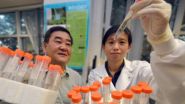(Press-News.org) Before you revive the debate about which sibling in your family is the favorite, you'll want to know what the latest research shows.
Brigham Young University professor Alex Jensen analyzed 282 families with teenage siblings for a study that appears in the Journal of Family Psychology. Favoritism in parenting is a complex topic for sure, but here are some important take-aways.
Does it really matter?
Yes, at least for some families. Jensen looked at perceived preferential treatment in different types of family dynamics. For families that aren't very close to each other – so-called "disengaged" families – favoritism was strongly associated with alcohol, cigarette and drug use by the less-favored children.
In these disengaged families, children who view themselves as slightly less favored were almost twice as likely to use alcohol, cigarettes or drugs. If the preferential treatment was perceived to be dramatic, the less favored child was 3.5 times more likely to use any of these substances.
In other words, favoritism appears to be the most problematic when love & support are generally scarce.
"With favoritism in disengaged families, it wasn't just that they were more likely to use any substances, it also escalated," Jensen said. "If they were already smoking then they were more likely to drink also. Or if they were smoking and drinking, they were more likely to also use drugs."
How can you tell who is the favorite?
When you ask people which sibling gets preferential treatment, their perception often doesn't match reality. But that's where things get tricky: Perceptions matter more.
"It's not just how you treat them differently, but how your kids perceive it," Jensen said. "Even in the case where the parents treated them differently, those actual differences weren't linked to substance use – it was the perception."
What should parents do?
For parents worrying about keeping score and managing perceptions of fairness, Jensen has some very simple advice.
"Show your love to your kids at a greater extent than you currently are," Jensen said. "As simple as it sounds, more warmth and less conflict is probably the best answer."
That's based on what they saw in the data – the link between substance use and favoritism didn't exist among families that take a strong interest in each other.
Jensen also recommends that parents look for unique things that each of their children are trying to build into their identity.
"Every kid as they get older develops their own interests and start to have their own identity," Jensen said. "If you value that and respect that, and as a parent support what they see as their identity, that would help them feel loved."
INFORMATION:
Favoritism linked to drug use in 'disengaged' families
2014-09-12
ELSE PRESS RELEASES FROM THIS DATE:
Brain inflammation dramatically disrupts memory retrieval networks, UCI study finds
2014-09-12
Irvine, Calif., Sept. 10, 2014 — Brain inflammation can rapidly disrupt our ability to retrieve complex memories of similar but distinct experiences, according to UC Irvine neuroscientists Jennifer Czerniawski and John Guzowski.
Their study – which appears today in the Journal of Neuroscience – specifically identifies how immune system signaling molecules, called cytokines, impair communication among neurons in the hippocampus, an area of the brain critical for discrimination memory. The findings offer insight into why cognitive deficits occurs in people undergoing chemotherapy ...
No innocent bystander: Cartilage contributes to arthritis
2014-09-12
Melbourne researchers have discovered that cartilage plays an active role in the destruction and remodelling of joints seen in rheumatoid arthritis, rather than being an 'innocent bystander' as previously thought.
Dr Tommy Liu, Professor Ian Wicks, Dr Kate Lawler, Dr Ben Croker and colleagues from the Walter and Eliza Hall Institute made the discovery while investigating the role of the protein SOCS3 in controlling inflammation during rheumatoid arthritis. The study was published in the journal Arthritis and Rheumatology.
Rheumatoid arthritis affects more than 400,000 ...
A meta-analysis of 3 types of peer norms and their relation with adolescent sexual behavior
2014-09-12
Researchers at Utrecht University and the New York State Psychiatric Institute collaborated on a meta-analysis of research on adolescent sexual behavior. The goal was to analyze how this behavior is related to adolescents' perceptions of three types of sexual peer norms, including how sexually active their peers are, how much their peers would approve of being sexually active, or how much they feel pressured by their peers to have sex. Awareness that these are different ways in which peers can affect adolescents' sexual behaviors is important for parents, teachers, and ...
Protein appears to protect against bone loss in arthritis
2014-09-12
AUGUSTA, Ga. – A small protein named GILZ appears to protect against the bone loss that often accompanies arthritis and its treatment, researchers report.
Arthritis as well as aging prompt the body to make more fat than bone, and the researchers have previously shown GILZ can restore a more youthful, healthy mix. It also tamps down inflammation, a major factor in arthritis.
Now they have early evidence that GILZ might one day be a better treatment option for arthritis patients than widely used synthetic glucocorticoids, which actually increase bone loss, said Dr. Xingming ...
Dendritic cells affect onset and progress of psoriasis
2014-09-12
Different types of dendritic cells in human skin have assorted functions in the early and more advanced stages of psoriasis report researchers in the journal EMBO Molecular Medicine. The scientists suggest that new strategies to regulate the composition of dendritic cells in psoriatic skin lesions might represent an approach for the future treatment of the disease.
"We urgently need new ways to treat psoriasis, treatments that will deliver improved benefits to patients and reduce the incidence of known side effects for existing drugs," says EMBO Member Maria Sibilia, ...
Gray matter matters when measuring our tolerance of risk
2014-09-12
There is a link between our brain structure and our tolerance of risk, new research suggests.
Dr Agnieszka Tymula, an economist at the University of Sydney, is one of the lead authors of a new study that identifies what might be considered the first stable 'biomarker' for financial risk-attitudes.
Using a whole-brain analysis, Dr Tymula and international collaborators found that the grey matter volume of a region in the right posterior parietal cortex was significantly predictive of individual risk attitudes. Men and women with higher grey matter volume in this region ...
Age and diabetes duration linked to risk of death and macrovascular complications
2014-09-12
New research published in Diabetologia (the journal of the European Association for the Study of Diabetes) shows that age (or age at diagnosis) and duration of diabetes disease are linked to the risk of death and marcovascular complications (those in larger blood vessels), whereas only diabetes duration is linked to the risk of microvascular complications (in smaller blood vessels such as those in the eyes). This means younger people with diabetes are more at risk of microvascular complications since they are more likely to have diabetes for longer over their lifetimes ...
The Lancet: Combining gut hormone with insulin proves more effective at controlling type 2 diabetes than other common treatments
2014-09-12
Combined treatment with a drug that mimics the action of a gut hormone and basal insulin [1] is more effective at improving blood sugar control than other anti-diabetic treatments, with similar rates of hypoglycaemia (dangerously low blood sugar levels) and greater weight loss, a systematic review and meta-analysis published in The Lancet shows.
"Achieving normal blood sugar levels in people with type 2 diabetes is compromised by the adverse side effects plaguing currently available treatments. Some anti-diabetic treatments increase risk of hypoglycaemia and weight gain ...
Many kidney failure patients have concerns about pursuing kidney transplantation
2014-09-12
Washington, DC (September 11, 2014) — Concerns about pursuing kidney transplantation are highly prevalent among kidney failure patients, particularly older adults and women, according to a study appearing in an upcoming issue of the Clinical Journal of the American Society of Nephrology (CJASN). Reducing these concerns may help decrease disparities in access to transplantation.
There are thousands of patients with kidney failure who lack access to kidney transplantation, and disparities persist in terms of race, age, sex, and other patient characteristics. To improve ...
Microbes evolve faster than ocean can disperse them
2014-09-12
Two Northeastern University researchers and their international colleagues have created an advanced model aimed at exploring the role of neutral evolution in the biogeographic distribution of ocean microbes.
Their findings were published Thursday in the journal Science. The paper—titled "Biogeographic patterns in ocean microbes emerge in a neutral agent-based model"—was co-authored by Ferdi Hellweger, a microbial ecology expert and an associate professor of civil and environmental engineering; his doctoral student Neil Fredrick, PhD'15; and oceanographer Erik van Sebille ...



